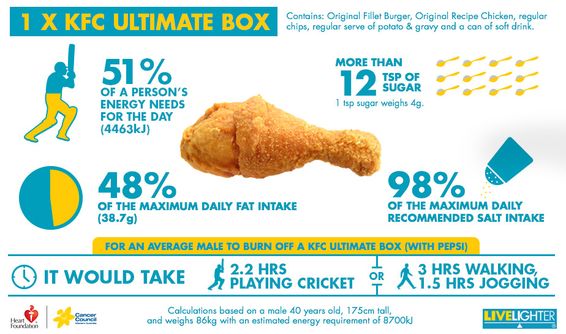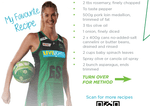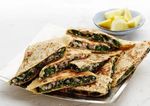Junk food in sport, just isn't cricket
by Emma Groves, Obesity Policy Senior Coordinator
- December 24, 2017
- Leave a comment
- WA
- Families
- Health professionals
- Marketing
- Healthy eating
- Physical activity
- Weight Management
- Industry
- Junk Food
- Public Health
- Advocacy
Fried Chicken and Sport? It's just not cricket.
KFC continues to exploit Australia's love of cricket over the summer holiday period, with a heavily marketed junk food campaign including sponsorship of Cricket Australia's Big Bash League.
Turning our passion for sport into a profit, KFC's summer campaign started in November, with their promotion of the HCG Buckethead Army. TV advertising during peak viewing times, PR stunts designed to grab attention and a website encouraging people to share a picture wearing a 'HCG Bucket' Hat through social media, promotes the association of KFC in cricket and is normalising our attitude to junk food.
It's a junk food marketing battle hard to beat.
In WA, KFC spends $3.35 million on TV, radio, cinema and outdoor in advertising over 12 months. This doesn't include digital, social media and the sport sponsorship. and with 45% of West Australians adults eating junk food more than once a week ensures a profitable business.
KFC’s Ultimate Box contains 51% of a person’s energy needs for the day (based on the recommended average energy requirement of 8,700 kilojoules per day). 
Over 2 hours of playing cricket needed to work off KFC meal
It would take an average male more than two hours at the crease to burn off just one KFC Ultimate Box. This one meal also contributes almost 50% of the maximum daily fat intake, 98% of a person’s recommended maximum salt intake for the day and almost 12 teaspoons of sugar, double the World Health Organisation’s recommended daily guidelines.
It's just not cricket facts
- Overweight and obesity rates are growing at alarming levels in Australia
- Junk food is more and more common in the diets of Australians. Public health campaigns raise awareness to make the healthy choice the easy choice for everyone. It's disappointing to see junk food chains undermine these messages.
- Tactics used by junk food companies, including sponsorship of elite sporting events and aggressive marketing to children adds to the problem.
- Junk food companies wouldn't be sponsoring sport if it wasn't profitable for them. Studies have shown that an endorsement of a product by an athlete increases sales, particularly to children.
Junk food has no nutritional value. Junk food doesn't have a place in sport. It's a conflicting message to the public, celebrating healthy athletes on one hand, then being bombarded by junk food marketing on the other.
Junk food is not a good option to be eating while watching the cricket. We have plenty of 'watching sport' inspired recipes to choose from.




